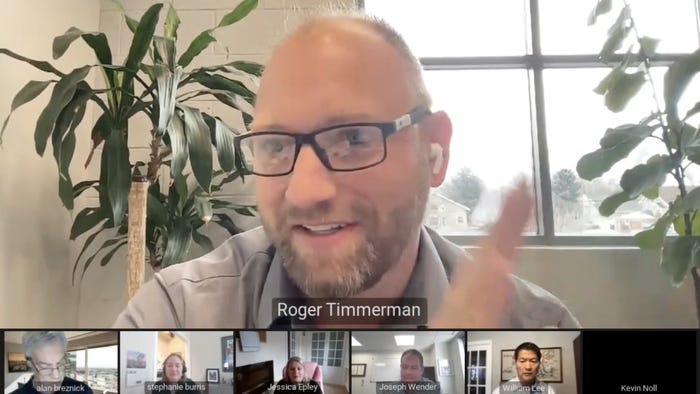Speaking on a panel about the digital divide, Roger Timmerman, CEO of Utopia Fiber, lamented that federal broadband programs may come up short 'because the standards are too low.'

On a panel this week about the digital divide, Roger Timmerman, CEO of Utopia Fiber, called out the "army" of lobbyists that are keeping broadband speed standards down in the US.
"The problem is we've got an $8 million a week lobbying effort from big telecom, and so anytime the federal government – or even now at the state level – when any of them try to raise that bar for the standard of what consumers need for broadband, there's an army of lobbying that goes up and opposes that. And they're very effective," said Timmerman.
The comments were made during a virtual Bridging the Digital Divide Symposium hosted by the research firm Heavy Reading (a sister company to Light Reading), in response to a question about varying speed standards for different federal broadband programs. While the Treasury Department uses a 100/100 Mbit/s standard for capital projects funded through the American Rescue Plan, the NTIA's $43 billion Broadband Equity, Access and Deployment program (BEAD) requires grant recipients to build to a minimum of 100/20 Mbit/s.
Figure 2:  Pictured: Roger Timmerman (Utopia Fiber), Alan Breznick (Heavy Reading), Stephanie Burris (Viavi Solutions), Jessica Epley (Ziply Fiber), Joseph Wender (US Treasury Department) and William Lee (Vecima).
Pictured: Roger Timmerman (Utopia Fiber), Alan Breznick (Heavy Reading), Stephanie Burris (Viavi Solutions), Jessica Epley (Ziply Fiber), Joseph Wender (US Treasury Department) and William Lee (Vecima).
(Source: Heavy Reading)
According to Joseph Wender, director of the capital projects fund at the US Treasury Department, who appeared on the panel, the Treasury Department "had the flexibility to be able to go higher" because Congress did not mandate a speed standard in the American Rescue Plan, whereas the Infrastructure Investment and Jobs Act, which funds BEAD, specifies a 100/20 Mbit/s minimum standard for new broadband projects and defines an "unserved" area as one without access to 25/3 Mbit/s.
"I think Americans expect us to use these dollars in the most efficient way possible, and have the longest impact. That's why we chose 100/100, knowing full well that that would result primarily in fiber, which would not just support 100/100, it would support speeds wildly higher than that over the course of decades," said Wender.
But Timmerman, who said he is a "big proponent of raising the standards," said that not only are our current standards below consumer expectations for broadband, but they may leave us with "a lot of money with not anywhere to spend it."
"Even 100-meg, you know, we're still redlining off enormous populations that have lousy broadband and are making them ineligible for funding," he said.
"What that does is it pushes the programs where the money is going to be spent into those $50,000 per household capacities, into the really rural areas. So $42 billion is a lot of money, and it'll be a lot of fiber," Timmerman added, referring to the BEAD program. "But the problem is it won't be nearly enough money because of how it's being administered, because the standards are too low."
'Fiction of overbuild'
Timmerman's argument is the opposite of one routinely made by cable and wireless industry representatives who warn of "overbuilders" receiving federal dollars to bring broadband to "underserved" areas, or areas without access to speeds of 100/20 Mbit/s. Indeed, a recent report from ACA Connects, an organization that represents small and midsized cable operators and telcos, declares that BEAD funds are sufficient to close the digital divide.
But what some in the industry call overbuild, others call necessary competition.
"This whole, you know, fiction of overbuild, it's like, if it's not fiber, it's not overbuild," said Timmerman. "If there's something there that's not fiber ... it's analog."
Adding to the speed standards discussion, Jessica Epley, VP of regulatory and external affairs at Ziply Fiber, said the company treats speed standards as a minimum. Ziply was formed in 2020 from the acquisition of Frontier Communications' northwest operations. The company received $50 million in funding from Cable One last year for its fiber buildout and cable upgrade plans.
"We're not deploying a network that's going to be capable of 100 by 100 service. We're deploying a network that today is capable of 5-Gig by 5-Gig service and we're looking ahead to 10-Gig and 100-Gig and beyond," said Epley. "There's no sense in having this conversation about broadband speeds. Because if we're not deploying the best technology that we have available to us today, with this one-time money, we're missing a great opportunity."
Speaking for the vendor community, Bill Lee, vice president of global professional services at Vecima Networks (a sponsor on the panel) noted that the current standards allow incumbents to use their existing infrastructure to reach customers faster.
"In a sense, we're not able to have fiber to these cities overnight. And this is that stair-step approach to allow most residents to be able to get some bandwidth, at least 100 by 100, you know, in the near future," he said.
Closing out the session, moderator and Heavy Reading senior analyst Alan Breznick prompted panelists to share a few words on where fiber deployments will be in a year from now.
"Tremendous progress will be made," said Wender.
"Barely getting started," said Epley.
"Massive. But constrained by limited resources," added Timmerman.
Related posts:
— Nicole Ferraro, editor, Light Reading, and host of "The Divide" podcast.
About the Author(s)
You May Also Like











